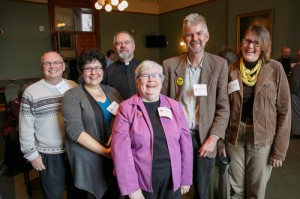By Murray MacAdam

A society that provides enough for everyone’s basic needs is within reach, a Queen’s Park forum heard Nov. 13. The forum, organized by the Interfaith Social Assistance Reform Coalition (ISARC), focused on strategies for Ontario’s poverty reduction movement. It drew 50 people from as far as Kingston, including ten Anglicans, as well as six MPPs from all three parties, who attended briefly.
A powerful theological reflection by Rabbi Tina Grimberg opened the forum, focusing on the Jewish concept of tzedakah, meaning the obligation to do what is just and share one’s income with the poor. “We are partners in creation,” said Rabbi Grimberg. “The divine presence pushes us to do what is right. God is present, but it’s your job, our job.”
Economist Greg deGroot-Maggetti, Poverty Programs Coordinator for the Mennonite Central Committee, outlined how recent trends, including cuts in employment insurance, inadequate funding for affordable housing, and tax cuts which reduce public revenues, have worsened poverty. “Poverty doesn’t just happen,” he noted.
Aside from moral arguments against poverty, said Mr. deGroot-Maggetti, current policies that keep people trapped in poverty simply make no sense. Poverty leads to higher healthcare and criminal justice costs, it creates an “us” and “them” divide in society, and is bad for the economy.
Yet the news is by no means all bad as Ontario wraps up its first five-year Poverty Reduction Strategy. The Ontario Child Benefit program has helped low-income families, while the provision of full-day kindergarten is another major advance. And while the government failed to reach its goal of reducing child poverty rates by 25 per cent, the child poverty rate dropped by 15.2 per cent in 2008 to 13.6 per cent in 2011.
A second five-year poverty reduction plan will be put forward by the government early in 2014, and Mr. deGroot-Maggetti urged that it include bold targets, such as cutting the overall poverty rate from 12 per cent to 6 per cent. Higher social assistance rates, a minimum wage increase from $10.25 per hour to $14 per hour, and increased investments in affordable housing can help meet this target.
New Democratic MPP Cheri DiNovo decried rising demand for foodbanks and long waits for social housing. She noted that four times she has introduced a Private Member’s Bill to amend Ontario’s Planning Act to allow municipalities to enact inclusionary zoning laws requiring housing developers to include a percentage of affordable homes in new developments. Yet each time it’s been defeated in the Legislature. Such a measure, if passed when first proposed, would have led to 12,000 affordable homes by now, said Ms DiNovo.
Echoing a common refrain at the forum, she urged her listeners to get more involved in advocacy with government. “People of faith too rarely speak in the halls of power,” she said.
Liberal MPP Laura Albanese, from one of Ontario’s lowest-income ridings, noted the great needs among people she represents and said “we have to strive not to leave anyone behind.”
Toronto city councilor Joe Mihevc urged participants to discover “power-brokers” who can influence politicians, and work with them. Simply using arguments based on facts and arguments is not enough. We need to think about the psychological factors – “the ocean of emotion” – that shape the attitudes people have towards political issues and public life. “We need to appeal to people’s imaginations,” said Mr. Mihevc.
Interested in joining the Diocese’s advocacy efforts? Visit the Social Justice and Advocacy page.